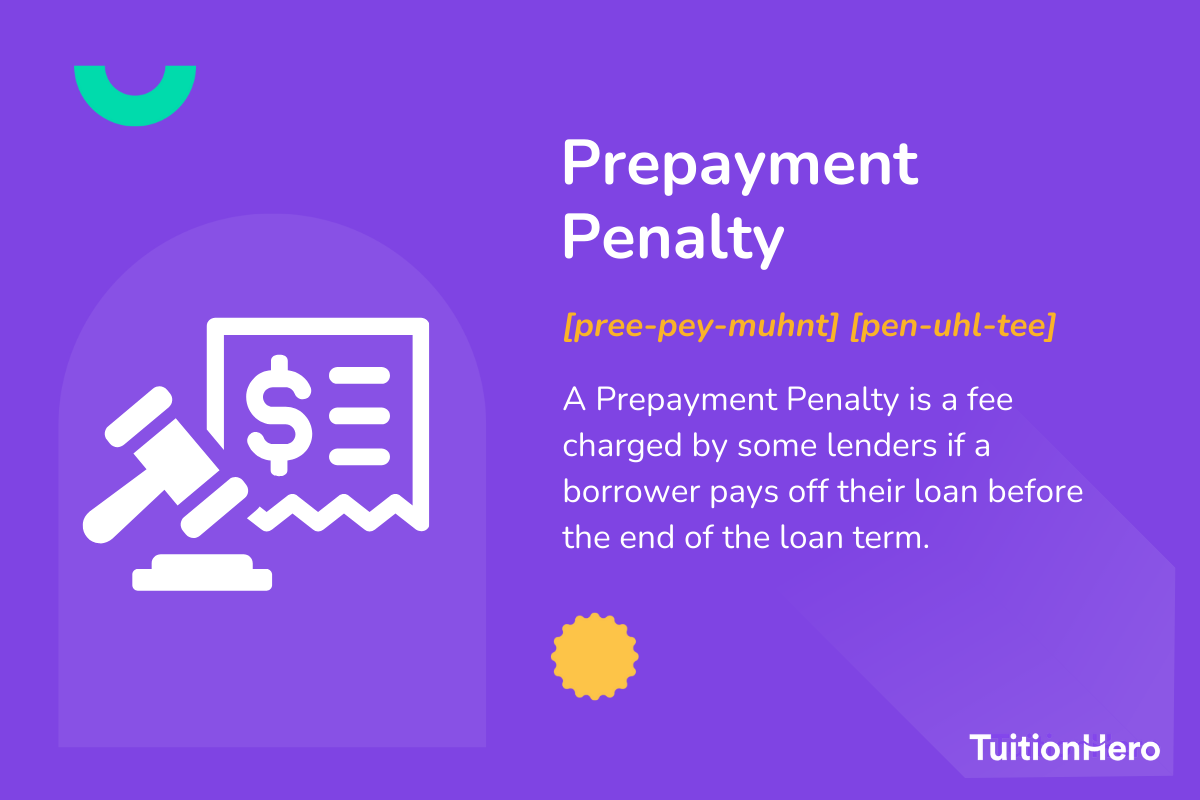Advertiser Disclosure
Last update: February 23, 2025
5 minutes read
What Is a Prepayment Penalty on a Loan?
Learn the ins and outs of loan prepayment fees and penalties, and how to dodge them with ease.

By Derick Rodriguez, Associate Editor
Edited by Brian Flaherty, B.A. Economics
Learn more about our editorial standards



By Derick Rodriguez, Associate Editor
Edited by Brian Flaherty, B.A. Economics
Learn more about our editorial standards
Did you know that paying off your loan early could result in a fee? It's called a prepayment penalty, and it might catch you off guard. A prepayment penalty is a fee some lenders charge if you pay your loan off early. You'll learn how these penalties work, why they exist, and strategies to avoid them, making your journey to financial freedom smoother.

Key takeaways
- A prepayment penalty is a fee charged for paying off a loan ahead of schedule
- There are both soft and hard prepayment penalties, with varying costs and triggers
- Federal housing, veteran, and student loans typically do not have prepayment penalties
What is a prepayment penalty on a loan?
A prepayment penalty on a loan is a fee charged by a lender when a borrower pays off their loan before the predetermined schedule. This penalty compensates the lender for the interest they might lose by the loan being repaid early.

Why would paying off my loan early trigger a fee?
Lenders have a straightforward reason for charging a prepayment penalty: they're banking on interest to make money. When you take out a loan, the lender isn't just doing you a favor; they're in it to profit from the interest you pay over the life of that loan.
If you pay back your loan earlier than expected, the lender will have to reinvest that money elsewhere, which could be at a lower interest rate or to a more risky borrower. The prepayment penalty compensates lenders for that risk, incentivizing borrowers to stick with the original plan.
How do prepayment penalties work?
Different loans come with different shapes and sizes of prepayment penalties. It’s essential to know what you might face. Common types include:
- Soft prepayment penalties: Common in the mortgage world, a “soft” penalty only applies in certain circumstances. For instance, selling your home might be okay, but refinancing or paying a lump sum early will trigger a penalty.
- Hard prepayment penalties: These are the no-excuses type - sell, refinance, or pay a large amount early, and you will get a fee.
What determines the cost of a prepayment penalty?
The cost of a prepayment penalty can be tricky and differs a lot. If the penalty isn’t a set amount detailed in your loan contract, it might depend on how much principal is left on your loan or be calculated based on a few months’ interest payments.
- Percentage of remaining loan balance: For instance, a 2% fee if paid off within the first few years.
- A fixed number of months’ interest: Imagine being charged six months’ worth of interest as your penalty.
- Fixed amount: Less common for mortgages, sometimes there’s a flat fee like $3,000.
- Sliding scale: Based on the length of time you've had your loan, penalties can decrease over time.
Typically, a percentage penalty might look like 2% of your outstanding balance if you pay off during the first year. The exact figures will depend on your specific loan terms.

TuitionHero Tip
Being aware of potential fees helps you calculate risks and make smarter financial choices.
When is a prepayment penalty illegal?
In some cases, prepayment penalties aren't just a headache; they’re illegal. Mortgages obtained through the Federal Housing Administration, Veterans Affairs, or the US Department of Agriculture are free from these penalties. And breathe a sigh of relief, students; your loans are prepayment penalty-free, too, regardless of private or public status.
- FHA loans: No prepayment penalties permitted.
- VA loans: Protected against prepayment fees.
- USDA loans: Penalty-free, designed to make homeownership more affordable.
- Student loans: You won’t find prepayment penalties here.
How can I avoid a prepayment penalty?
Avoiding a prepayment penalty is simpler than it seems, and you've got some options to keep that money in your pocket:
- Shop for penalty-free loans: Choose a lender that doesn't charge these fees.
- Read your loan estimate and contract: Watch out for the prepayment penalty clause—it's often right there in the contract addendums.
- Consider negotiating: If there's a rule about paying early, but you really like the other terms, talk to your lender before taking out the loan. They might be willing to work with you and be flexible.
- Understand when penalties apply: Selling your home within a few years? Refinancing soon? These actions might open the prepayment penalty box.
Compare private student loans now
TuitionHero simplifies your student loan decision, with multiple top loans side-by-side.
Compare Rates
Dos and don'ts of managing a prepayment penalty
Prepayment penalties can be confusing, but here's a simple table to guide you through the dos and don'ts, helping you avoid potential fees while keeping your financial status stable.
Do
Do read the fine print of your loan agreement.
Do shop around to find loans without prepayment penalties.
Do ask your lender to clearly explain any prepayment clauses.
Do consider the likelihood of selling or refinancing early on a mortgage.
Do calculate the cost benefits of paying the penalty versus waiting.
Don't
Don't overlook the potential of prepayment penalties in your loan.
Don't rush into a loan without understanding the full cost.
Don't hesitate to negotiate the terms of your prepayment clause.
Don't ignore the illegalities of prepayment penalties on some loans.
Don't assume every extra payment will trigger a penalty.
Advantages and disadvantages of a prepayment penalty
Prepayment penalties are usually viewed negatively, but there are situations where they might make financial sense for both lenders and borrowers. Understanding the advantages and disadvantages is critical in weighing whether a loan with a prepayment penalty aligns with your financial plans.
- Loans with prepayment penalties usually come with lower interest rates.
- It encourages borrowers to stick to their repayment plan, leading to better budgeting and financial discipline.
- Lenders may be more willing to negotiate other terms of the loan in exchange for the inclusion of a penalty clause.
- Even if interest rates fall, a penalty might lock you into a higher rate.
- Life is unpredictable; penalties can make it costly to adapt to changes.
- If you do pay off your loan early, the penalty is an extra, avoidable expense.
- Penalty clauses can be confusing, leading some to rack up penalties unintentionally.

Why trust TuitionHero
At TuitionHero, we streamline college finances by offering transparent guidance on managing student loans, including potential fees like early payment charges. Our personalized approach assists in finding solutions tailored to your needs, whether through scholarship opportunities or FAFSA assistance. With most loans allowing early payment without penalties, we support your debt payoff journey hassle-free. Let's work together to make your college financing journey smoother.
Frequently asked questions (FAQ)
Prepayment penalties are more common in mortgage loans, personal loans, and certain auto loans. However, they’re generally not found in student loans or FHA, VA, & USDA housing loans.
The terms of prepayment penalties are typically outlined in the loan agreement. However, in some cases, lenders may have the flexibility to adjust penalty terms, so it's crucial to review your loan agreement regularly.
No, conditions for soft prepayment penalties can vary between lenders. Some may apply only if you refinance, while others might also include making a big lump sum payment early in the loan term.
Final thoughts
Learning about prepayment penalties can help you avoid unexpected financial setbacks. Keep in mind that being informed is crucial in the financial world.
When you understand the details of your loan agreement, you can make sure that taking the initiative with your repayments benefits you rather than causing problems. If you want more information or guidance, our experts at TuitionHero are ready to help with your financial education and needs.
Source
Author

Derick Rodriguez
Derick Rodriguez is a seasoned editor and digital marketing strategist specializing in demystifying college finance. With over half a decade of experience in the digital realm, Derick has honed a unique skill set that bridges the gap between complex financial concepts and accessible, user-friendly communication. His approach is deeply rooted in leveraging personal experiences and insights to illuminate the nuances of college finance, making it more approachable for students and families.
Editor

Brian Flaherty
Brian is a graduate of the University of Virginia where he earned a B.A. in Economics. After graduation, Brian spent four years working at a wealth management firm advising high-net-worth investors and institutions. During his time there, he passed the rigorous Series 65 exam and rose to a high-level strategy position.
At TuitionHero, we're not just passionate about our work - we take immense pride in it. Our dedicated team of writers diligently follows strict editorial standards, ensuring that every piece of content we publish is accurate, current, and highly valuable. We don't just strive for quality; we aim for excellence.
Related posts
While you're at it, here are some other college finance-related blog posts you might be interested in.
Shop and compare student financing options - 100% free!

Always free, always fast
TuitionHero is 100% free to use. Here, you can instantly view and compare multiple top lenders side-by-side.

Won’t affect credit score
Don’t worry – checking your rates with TuitionHero never impacts your credit score!

Safe and secure
We take your information's security seriously. We apply industry best practices to ensure your data is safe.
Finished scrolling? Start saving & find your private student loan rate today
Compare Personalized Rates




